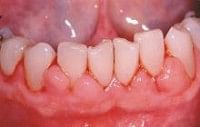Check your dental health

Are your gums sore, bleeding or shrinking? Are your teeth wobbly or sensitive? If any of your answer is yes, you may have a silent disease.
Periodontal disease (a disease of gums and supportive tissues surrounding teeth) is silent and often has no symptoms. It can silently damage the soft tissues and bone that support the teeth.
Healthy teeth fit snugly in place
Teeth roots are surrounded by a strong foundation of gums and supportive tissue. This tissue holds teeth firmly to the bone. In an unhealthy mouth, bacteria help periodontal disease to develop.
Bacteria live and grow in our mouth. They form as sticky, colorless film (plaque) on teeth and gums. If plaque is not removed properly, it can harden into rough yellowish brown deposits known as tartar (also called calculus). Bacteria from plaque and tartar can lead to periodontal disease.
A mild form of periodontal disease is gingivitis, which may progress to periodontitis and lead to advanced periodontitis. Gingivitis: Bacteria of plaque and tartar produce toxins that irritate gums and cause inflammation. Symptoms may include sore, slightly bleeding gums or bad breath. Gingivitis is a mild form of gum disease that can usually be reversed with daily brushing and flossing, and regular cleaning by a dentist or dental hygienist.
Periodontitis: The spaces between gum and tooth increase forming pockets and infection spreads to bone. The most common causes are plaque and tartar building up under the gum line causing ligament break down, gums pull away from the teeth. Symptoms may include bright red gums that bleed easily or shrink back (recede).
Advanced periodontitis: Bacteria increases the infection with more swelling gums, bone loss and teeth may loosen. Pockets are deepen and may fill with pus. Your teeth may feel sensitive to hot or cold and feel pain when brushing.
As bone loss continues, your teeth may loose so much support that they fall out. It is important that we visit a dentist or hygienist routinely so that they may be able to treat at the early stages of the periodontal disease.
Dentists can evaluate your periodontal disease properly and can guide you to the best treatment.
Certain risk factors can make gum disease worse.
1. Tobacco smoking or chewing: Increases your risk for periodontal disease and lowers the chances of success for treatments.
2. Diabetes: People with diabetes are at greater risk for periodontal disease. And having periodontal disease can make managing diabetes more difficult. If you have diabetes, these tips can help:
* See your dentist at regular interval for plaque control.
* Keep your blood sugar level under control. High blood sugar makes it harder for your body to fight infections, including periodontal disease.
3. Illnesses: Diseases like cancer or AIDS and their treatments can also affect the health of gums.
4. Pregnancy: Hormonal changes can make gums more sensitive and make it easier for gingivitis to develop. 5. Family history of periodontal disease and using certain medications, such as oral contraceptives, steroids, blood pressure medications, and cancer fighting drugs can increase the risk of developing periodontal disease.
Symptoms of gum disease are silent until the disease is advanced. They include:
* Bad breath that won't go away
* Red or swollen gums
* Tender or bleeding gums
* Painful chewing
* Loose teeth
* Sensitive teeth
Here are some things you can do to prevent periodontal diseases:
* Brush your teeth twice daily with a fluoride toothpaste
* Floss every day
* Eat a well balanced diet
* Don't use tobacco products
* Visit the dentist routinely for a check-up and professional cleaning
Periodontal treatment options
1. Periodontal Homecare treatment: Brush with fluoride toothpaste and floss daily.
2. Non-surgical treatment: Deep cleaning (Scaling and Root planning), antibiotics, bite correction, splinting
3. Periodontal surgery: Flap surgery, bone and tissue grafts
Visit a dentist regularly every six months and make home care a habit to reduce plaque buildup in the future. So the next time you brush your teeth know that you are saving more than just your smile.
The writer is the Director, Bangla Hope Dental Clinic, Dhaka, E-mail: [email protected]

 For all latest news, follow The Daily Star's Google News channel.
For all latest news, follow The Daily Star's Google News channel. 



Comments